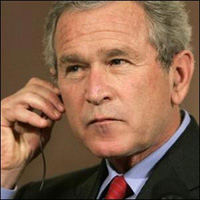Bush administration watches over millions of bank accounts after 9/11 attacks
The Bush administration is trying to create the image of the USA as a democratic country. It demands that many other countries around the world should follow the rules of American democracy. However at the same time US rulers are carrying plenty of secret programs, violating human rights and the only explanation is their counterterrorist efforts. There have been many scandals around secret prisons, secret eavesdropping and today the story repeats itself.

The Bush administration, relying on a presidential declaration of emergency, has secretly been tapping into a vast global database of confidential financial transactions for nearly five years, according to U.S. government and industry officials.
Secrecy appears to become an inseparable part of Bush’s policy.
Initiated shortly after Sept. 11, 2001, the surveillance program has used a broad new interpretation of the Treasury Department's administrative powers to bypass traditional banking privacy protections. It has swept in large volumes of international money transfers, including many made by U.S. citizens and residents, in an effort to track the locations, identities and activities of suspected terrorists.
Current and former counterterrorist officials said the program works in parallel with previously reported surveillance of international telephone calls, faxes and e-mails by the National Security Agency, which has eavesdropped without warrants on more than 5,000 Americans suspected of terrorist links. Together with a hundredfold expansion of the FBI's use of "national security letters" to obtain communications and banking records, the secret NSA and Treasury programs have built unprecedented government databases of private transactions, most of them involving people who prove irrelevant to terrorist investigators.
Stuart Levey, undersecretary of the Treasury for terrorism and financial intelligence, said in an interview last night that the newly disclosed program -- the existence of which the government sought to conceal -- has used the agency's powers of administrative subpoena to compel an international banking consortium to open its records. The Brussels-based cooperative, known as the Society for Worldwide Interbank Financial Telecommunication, or SWIFT, links about 7,800 banks and brokerages and handles billions of transactions a year, The Washington Post reports.
Swift is an industry cooperative, formed in 1973 by international banks and based in Belgium, that acts as an electronic gatekeeper for most of the world's major banks, brokerages, and investment managers to transmit funds across borders. Swift doesn't handle any funds, but processes some 11 million sets of transfer instructions and confirmations daily - more than 2.5 billion a year.
Through Swift, banks and brokerages relay information to each other about financial transfers through a series of standardized forms that contain large amounts of information, including the identities of sender and recipients, the amount being transferred, the account numbers used and intermediate banks. The actual funds or securities are transferred later by banks or clearing and settlement companies.
Swift's board of directors is chosen by member banks; its legal regulator is the National Bank of Belgium, The Wall Street Journal says.
The program is limited, government officials say, to tracing transactions of people suspected of having ties to Al Qaeda by reviewing records from the nerve center of the global banking industry, a Belgian cooperative that routes about $6 trillion daily between banks, brokerages, stock exchanges and other institutions. The records mostly involve wire transfers and other methods of moving money overseas and into and out of the United States . Most routine financial transactions confined to this country are not in the database.
That access to large amounts of confidential data was highly unusual, several officials said, and stirred concerns inside the administration about legal and privacy issues.
"The capability here is awesome or, depending on where you're sitting, troubling," said one former senior counterterrorism official who considers the program valuable. While tight controls are in place, the official added, "the potential for abuse is enormous."
The program is separate from the National Security Agency's efforts to eavesdrop without warrants and collect domestic phone records, operations that have provoked fierce public debate and spurred lawsuits against the government and telecommunications companies.
But all the programs grew out of the Bush administration's desire to exploit technological tools to prevent another terrorist strike, and all reflect attempts to break down longstanding legal or institutional barriers to the government's access to private information about Americans and others inside the United States .
Officials described the Swift program as the biggest and most far-reaching of several secret efforts to trace terrorist financing. Much more limited agreements with other companies have provided access to A.T.M. transactions, credit card purchases and Western Union wire payments, the officials said, The New York Times reports.
Source: agencies
Prapared by Alexander Timoshik
Pravda.ru
Discuss this article on Pravda.ru English Forum
Subscribe to Pravda.Ru Telegram channel, Facebook, RSS!


